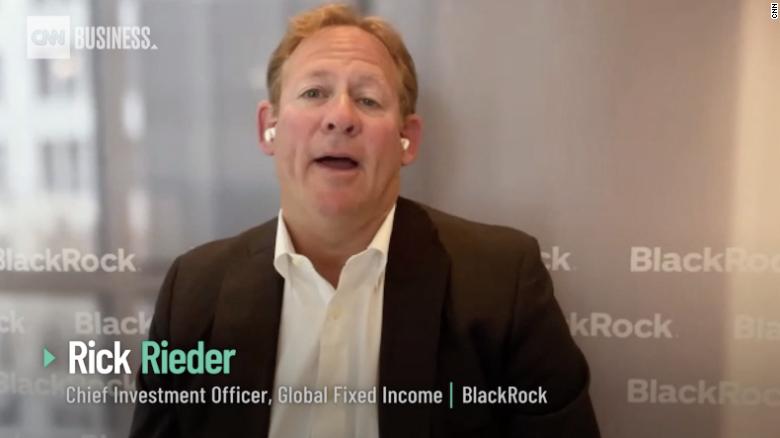SPAC fundraising is up an insane 2,000% from a year ago

The SPAC market is so hot that this year’s fundraising haul has already surpassed all of 2020’s. And it’s not even April. Understandably, the world’s largest asset manager worries the SPAC boom is overdone.
“If you look at the SPAC market, there’s some really attractive new companies and new technologies coming to the market that are financing effectively,” BlackRock executive Rick Rieder told CNN Business. “And then there are some that make no sense.”
Rieder, BlackRock’s chief investment officer of global fixed income, urged investors to use caution before entering this space.
“You’ve got to be really selective about where you go and not just jump onto that train because it’s gotten crazy,” he said.
It’s hard to argue with that point. Special purpose acquisition companies (SPACs), shell companies that only exist to take private entities public, have become all the rage on Wall Street. Even celebrities like Alex Rodriguez and Jay-Z are getting into the blank-check boom.
$83 billion in US SPACs this year alone
US-listed SPACs have raised $83.1 billion so far this year, according to Dealogic stats. That is up 2,031% — or 20-fold — from the same point of last year. As of Tuesday, the 2021 SPAC market exceeded 2020’s total of $82.6 billion.
One concern is that the amount of SPAC money hunting for merger candidates may exceed the number of quality private companies open to going public.
Rieder pointed out that some SPACs are going public with lofty valuations that value them at 40 or even 50 times their revenue. “There’s no chance you could ever grow into that,” he said.
The comments from Rieder add to a chorus of concerns raised about SPACs by some experts, including famed investor Jeremy Grantham, former Dallas Federal Reserve President Richard Fisher and Bill Dudley, the former NY Fed president.
Others, like hedge fund manager Mark Yusko think the criticism is misplaced because they view SPACs as a cheaper, more flexible and a smarter way to raise money than traditional IPOs.
Homework required to sift through SPACs
Up until the past year or two, SPACs were reserved for the backwaters of Wall Street. The thinking was that these were low-quality companies that couldn’t handle the scrutiny of a traditional IPO.
But then a number of major companies including Virgin Galactic and DraftKings decided to go the SPAC route.
More recently, Bernard Arnault, Europe’s richest man, joined the SPAC boom. Other recent SPACs include Rocket Lab, a startup that builds small rockets to shuttle satellites to orbit and View, a SoftBank-backed smart window company. Online trading brokerage EToro announced a $10 billion merger with a SPAC earlier this week.
BlackRock’s Rieder said the sheer number of SPACs out there require investors to do their homework.
“It requires an intense amount of work,” Rieder said. “I think the period of, I’m just going to buy SPACs because that’s the thing to do and that’s going to keep going, that’s over. And hopefully that’s not coming back.”
Celebs are backing SPACs
Last week, the SEC issued an alert warning the public about the risks around celebrity-backed SPACs.
“Never invest in a SPAC based solely on a celebrity’s involvement,” the agency warned the public in an alert Wednesday.
Professional athletes including Colin Kaepernick and Shaquille O’Neal have recently backed SPACs, joining politicians like former House Speaker Paul Ryan and pop stars like Ciara Wilson.
“Celebrities, like anyone else, can be lured into participating in a risky investment or may be better able to sustain the risk of loss,” the SEC said. “It is never a good idea to invest in a SPAC just because someone famous sponsors or invests in it or says it is a good investment.”
Despite the SPAC boom and apparent froth in other corners of the market, Rieder doesn’t seem overly concerned about a systemic bubble that threatens the economy like the housing bubble did in the years before the Great Recession.
“I don’t see a lot of crisis-like bubbles out there,” Rieder said. “But there are some assets, some equities, where I look at them and I say, ‘Who in the world keeps buying these?’ But anyway, some people do.”
The stimulus check factor
One unexpected source of demand for stocks and other assets could be stimulus checks.
Although many Americans are using stimulus checks to pay off debt and make ends meet, others may be sending that extra cash into the stock market.
“I underestimated how big it would be,” Rieder said of the impact that stimulus checks have had on the stock market.
The hope is those investments will translate to wealth gains for average Americans as the stock market rises over time.
“I think it’s really healthy that stimulus money like this gets into assets that will appreciate,” Rieder said.